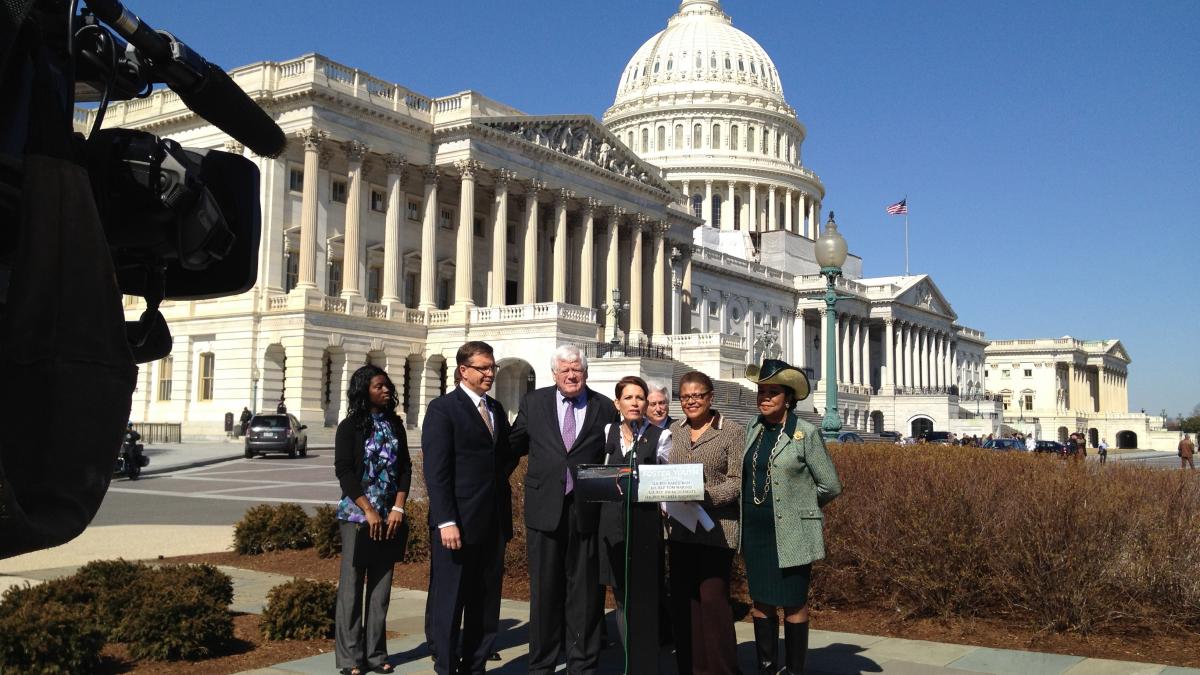U.S. Reps. Karen Bass, Jim McDermott, Michele Bachmann, Tom Marino Announce Bi-partisan Congressional Caucus on Foster Youth

WASHINGTON – On the heels of its inaugural Listening Tour stop in Los Angeles, the bipartisan Congressional Caucus on Foster Youth Co-Chairs, composed of U.S. Reps. Karen Bass (D-Calif.), Tom Marino (R-Penn.), Jim McDermott (D-Wash.) and Michele Bachmann (R-Minn.) announced the newly created entity to the public and its plan to examine several legislative proposals including the proposed over-prescribing of psychotropic medications to youth in the foster care system.
“As a new Member of Congress, I am very committed to continuing to improve the child welfare system on a federal level,” said Rep. Bass. “I look forward to collaborating with my colleagues by using our varied and diverse experiences to bring a significant change to the nation’s foster care system.”
“As a mom of five biological and 23 foster children, I am thrilled to be a part of the launch of the Congressional Youth Foster Caucus,” said Rep. Bachmann. “The Caucus’ mission is one of my personal goals as well: to protect and promote the welfare of foster children across America. My Caucus colleagues and I are working to bring stability, support and permanency to the lives of foster youth across this great nation.”
With more than 420,000 youth currently in our nation’s foster care system, the Caucus is committed to protecting and promoting the welfare of all children and youth in the system. This year, Caucus Members’ will continue an investigation began by Congressman Jim McDermott on the suggested overuse of psychotropic or mind-altering prescription drugs in the foster care system. A recent study by the Government Accountability Office, which studied children in five states who were enrolled in the Medicaid program, discovered that children in foster care were prescribed psychotropic medications at rates between 2.7 to 4.5 times higher than other children on Medicaid.
“The bipartisan Fostering Connections to Success and Increasing Adoptions Act, which I authored, was signed into law in 2008. It included provisions that required oversight of prescribing psychotropic drugs to foster care children. Over time, we have learned that more monitoring was needed, and this past September, Congress enacted additional bipartisan legislation, which I authored, that strengthened these provisions,” said Congressman McDermott, who is a trained child psychiatrist. “States are now required to develop protocols for the use and monitoring of psychotropic drugs in foster care. The U.S. Department of Health and Human Services is currently monitoring the states as they implement these stronger standards. I support the Foster Youth Caucus’ initiative to shine even more light on ensuring that foster children aren’t overprescribed powerful medications.”
Last week, several Members from the Caucus and Co-chairs Bass and Marino participated in the inaugural stop for its national Listening Tour, where attendants received an in-depth perspective of the unique prevention and family unification techniques that have made a tremendous difference in safely reducing the number of children in the Los Angeles foster care system. Los Angeles County has a population of 10.5 million and operates one of the nation's largest child welfare systems. In 2006, Los Angeles received a federal waiver allowing the county to have increased flexibility in how it funds its child welfare program, which resulted in the number of children in foster care decreasing from approximately 30,000 to 15,000 youth over the course of 12 years.
About the Congressional Caucus on Foster Youth:
Founded in 2011, the bipartisan Congressional Caucus on Foster Youth was created by co-chairs Reps. Karen Bass (D-Calif.), Tom Marino (R-Penn.), Jim McDermott (D-Wash.) and Michele Bachmann (R-Minn.) to protect and promote the welfare of all children in foster care and those who have “aged out” of the system. The Caucus will provide a forum for Members to discuss the challenges facing all foster youth and develop policy recommendations for improving child welfare outcomes in five focus areas: Safety; Permanency; Well Being; Educational Opportunities; and Youth, Family, and Community Engagement.